Vegetable risotto (satataš sa rižom, rice satarash) is a beloved Balkan dish often served as a side or a main course. This light sauce (stew) is made with sautéed peppers, onions, and tomatoes. The taste is rich and savory with a touch of sweet. Shall we?
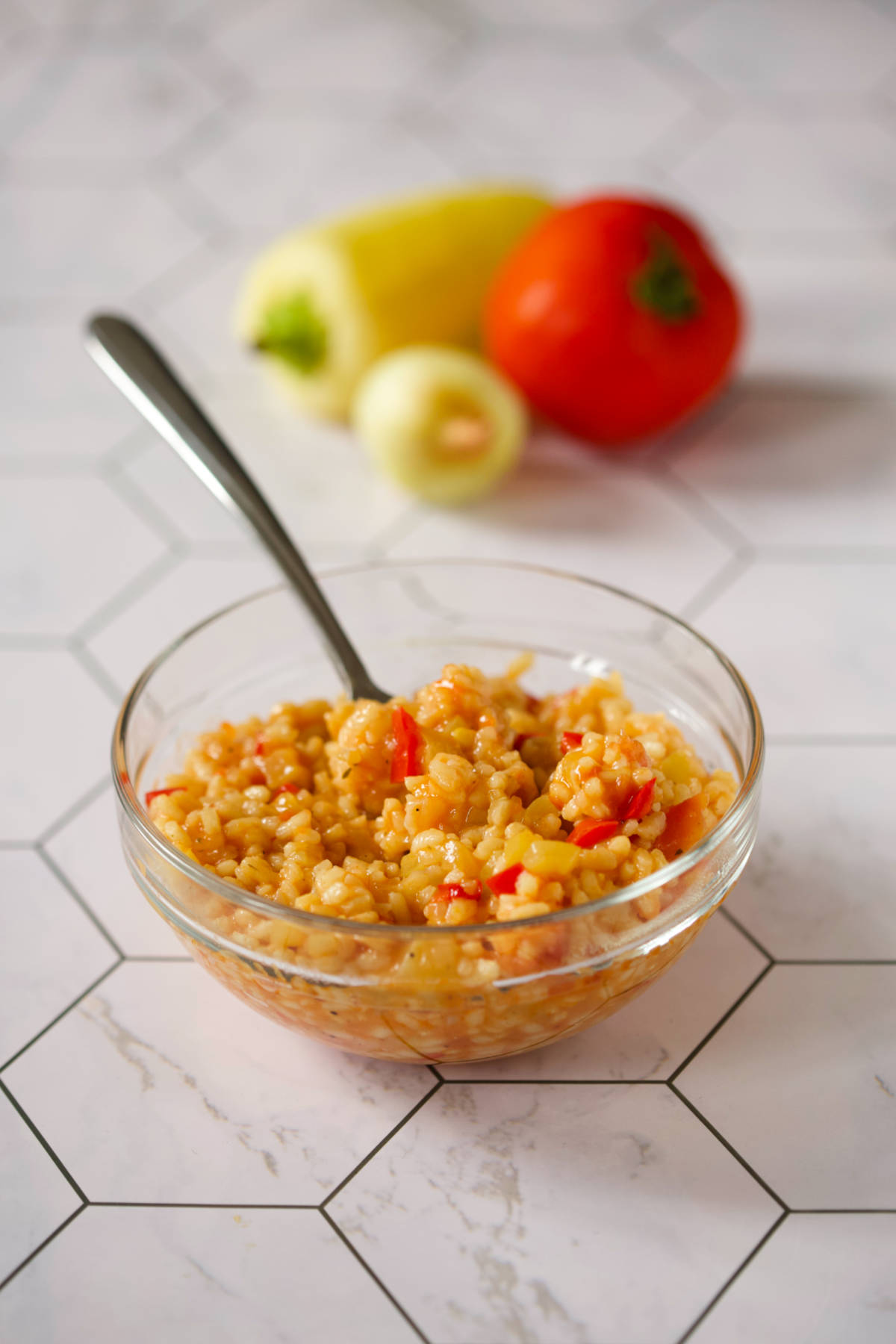
Jump to:
Background
Sataraš, the Balkan sautéed vegetable dish, is reminiscent of Hungarian lecsó, and Turkish menemen. This easy vegetable risotto has a tender, rich, and slightly sweet taste.
Classically, it's done with tomatoes, onions, and peppers. You can enhance it with eggs, or (like today), rice. It's a standalone dish, but you can easily add to it a side of protein like fish or meat.
Making sataraš allows you to enjoy a simple, flavorful, and healthy dish that celebrates the vibrancy of fresh vegetables.
Ingredients
Here are the ingredients for vegetable risotto (sataraš sa rižom):
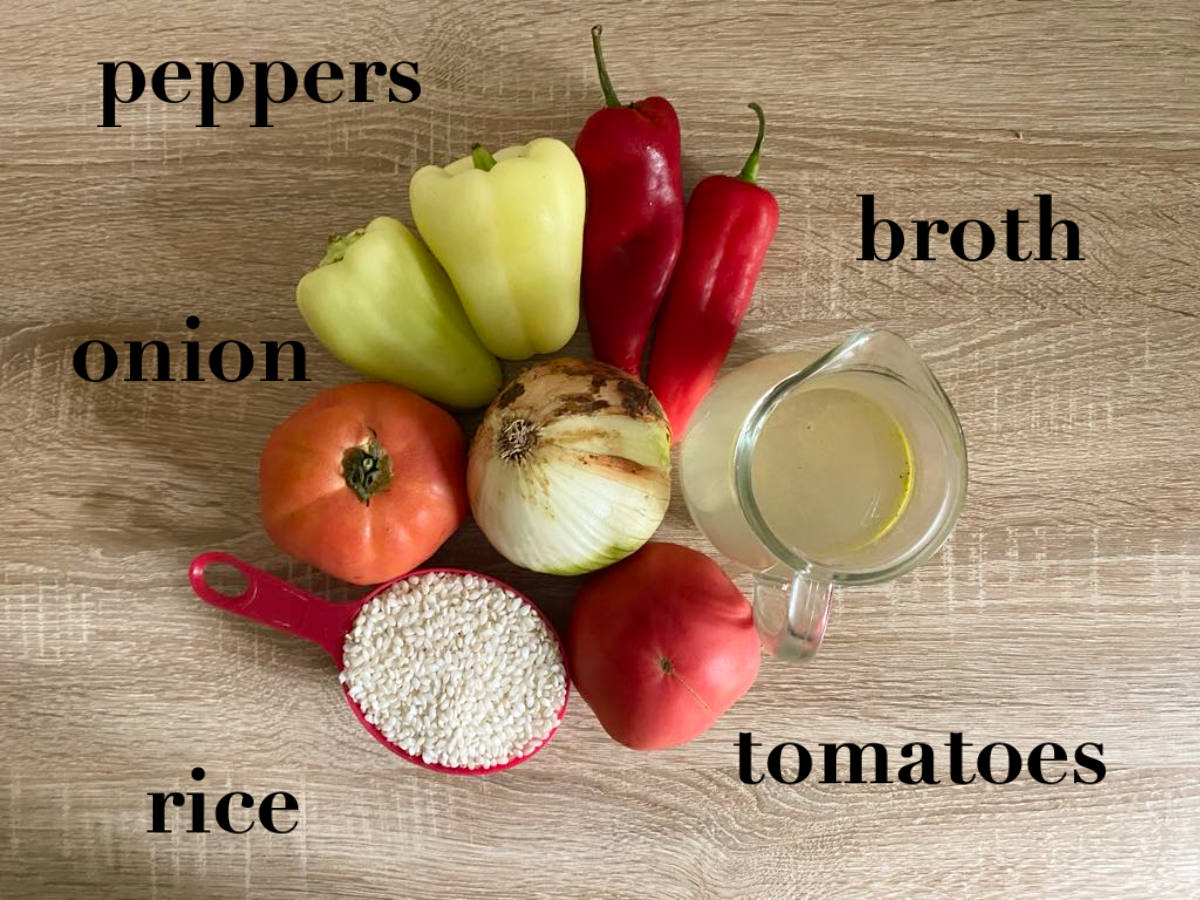
- Onion: yellow or white onion. Avoid red onion.
- Peppers: green, red, or yellow bell peppers, sweet Italian peppers. Substitute with local šilje, roge, or babura peppers.
- Tomatoes: Roma, heirloom tomatoes, or another juicy tomato kind are best. Avoid cherry tomatoes.
- Herbs and seasonings.
- Optional veggies: zucchini, eggplant, carrots.
- Optional: vegetable broth instead of water.
Instructions
How to make Balkan vegetable risotto (sataraš sa rižom):
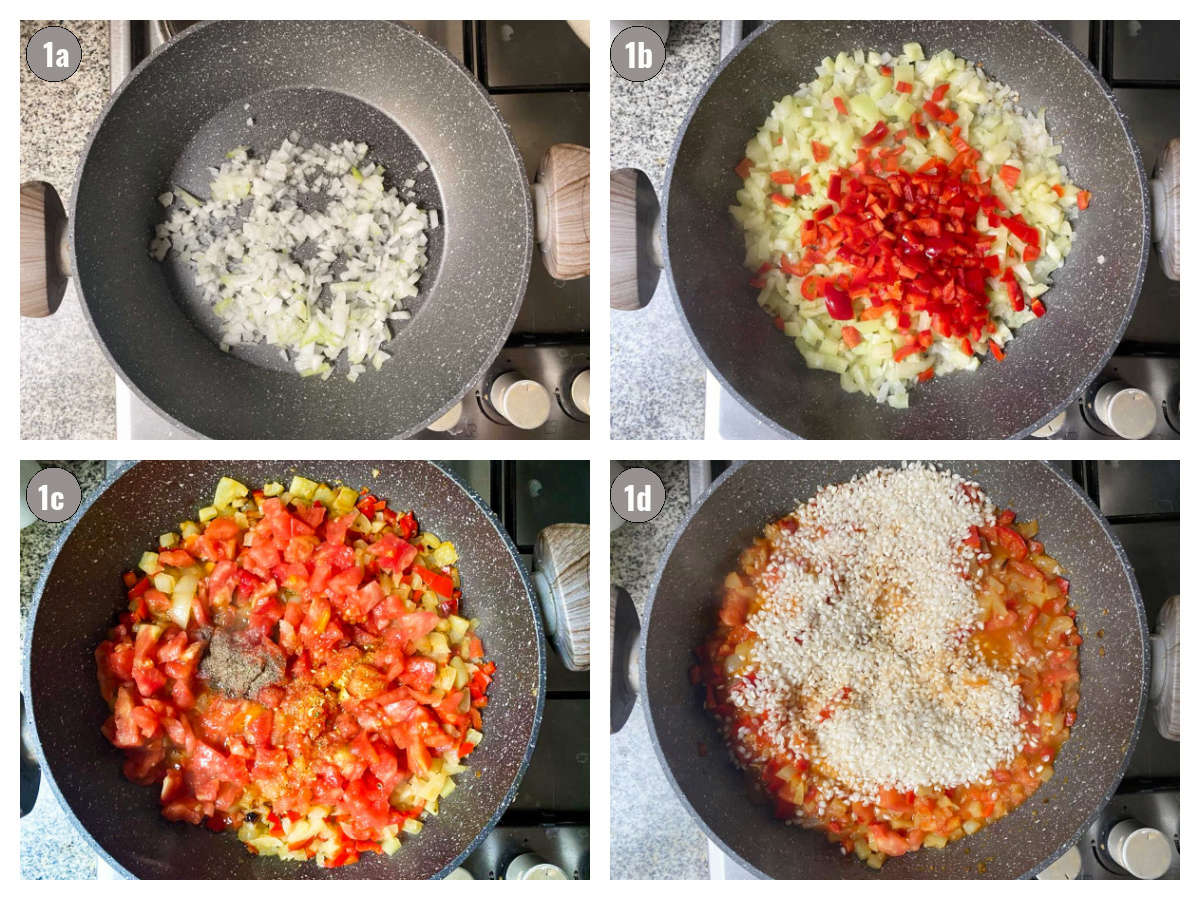
Step 1. Heat oil in a pan, add onions, peppers, tomatoes, and seasonings, simmering until vegetables are soft. Add rice, reduce heat to low, and simmer for 15-20 minutes, gradually adding 1.5-3.5 cups of water or broth until the rice and vegetables are tender and most of the liquid has evaporated.
Handling
- Serving: serve sataraš (vegetable risotto) immediately or soon after it's made. A side of homemade bread or fried mini breads goes perfectly with this dish. Meat lovers? Add a side of protein. Fish, meat, or tofu all work well.
- Storing: store in the fridge, in an airtight container for up to 48 hours.
- Heating: reheat using your preferred method. Add a little water or vegetable broth if needed.
More Veggie 💙
We at Balkan Lunch Box love veggies! Check some of our favorite recipes featuring beans, peppers, spinach and potatoes:
Thoughts?
If you made vegetable risotto (sataraš sa rižom) and liked it, please consider giving it a ⭐️⭐️⭐️⭐️⭐️ (5-star) rating. This helps others find the recipe more easily!
Also, feel free to leave a comment (I read each one!), and don't forget to tag a photo #balkanlunchbox, or us @balkanlunchbox, on IG.
Prijatno, Dobar Tek, and Bon Appetit!
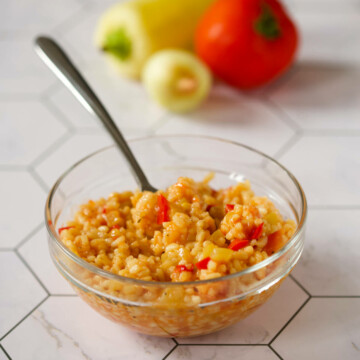
Vegetable Risotto (Sataraš sa Rižom)
Ingredients
- 4-6 tablespoons oil vegetable, sunflower, canola, coconut, avocado, or olive oil
- 2-2 yellow onions chopped into strips, or diced
- 3-4 bell peppers red and yellow cut into strips, or diced
- 2-4 tomatoes skinned and diced, with juices; heirloom or Roma, or another juicy kind
- 1 cup rice round short-grain, washed and rinsed
- salt and pepper to taste
- water or vegetable broth
- (Optional) 1-2 tablespoons Vegeta (if using water) or the same amount of bouillon, or vegetable stock powder
Instructions
- In a deep pan heat oil over medium. Add onions. Stir and simmer until they sweat. Add peppers, stir, and continue simmering until peppers sweat. (Cover or uncover as needed.) Finally, add tomato and seasonings, then continue stirring, and simmering, until vegetables are completely soft. Add a pinch of broth or water if all of the liquid evaporates. (Total simmer time is about 30 minutes.)
- Add rice to the pan, and bring the temperature down to low. Stir and simmer for an additional 15-20 minutes. As you're simmering, add a little bit of water (or broth) at a time. You'll be adding about 1.5-3.5 cups total, depending on the amount of rice and your personal preference. The dish is finished when the rice and vegetables are soft, tender, and moist while most of the liquid has evaporated.
- Serve sataraš (vegetable risotto) immediately or soon after it's made. A side of homemade bread or fried mini breads goes perfectly with this dish. Alternatively, add a protein side.Store in the fridge, in an airtight container for up to 48 hours. Reheat using your preferred method. Add a little water or vegetable broth if needed.
Video
Notes
- Ingredients

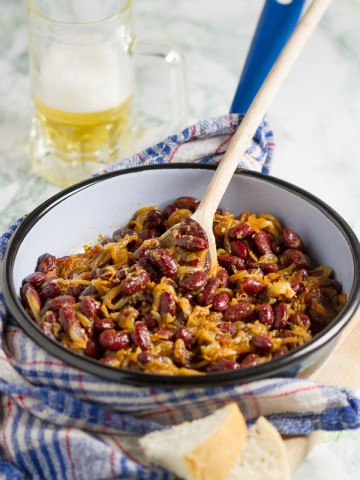
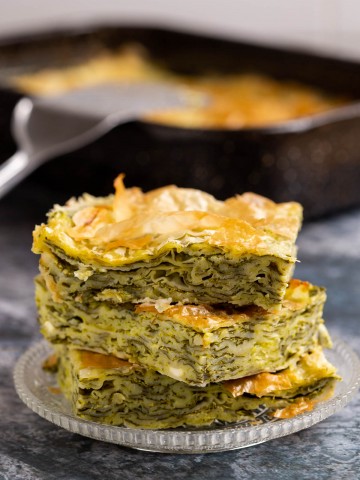


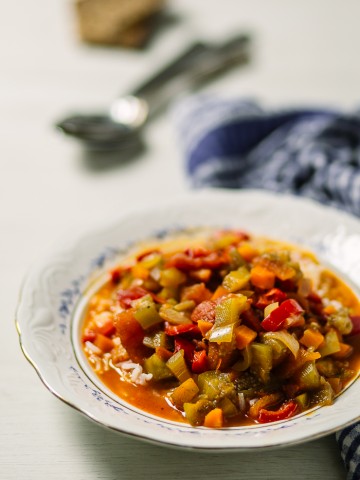




Azra says
Dear Aida,
I have been following your blog for a while now. When I read this post I couldn't keep myself from not replying :). To be honest I discovered you at Coolinarika and followed the link to your blog and liked it immediately. I like a good story for each recepie and your stories are very authentic,I suspected that you were a bookworm, given the quality of your written texts. In last years it was difficult for me to find a good book to read that would 'feed' me with some serious thoughts and ideas, however I was lucky enough to find some books this and past year that I enjoyed a lot. Therefore, I would recommend the newest book from Dzevad Karahasan - Sto pepeo prica (unfortunately you can only find it Bosnia, I ordered my from internet and my mom sent it to me in Austria because they ship only within BiH), a very good book that describes times that we live in (although the story takes place in year 1048-1131 I felt there was a lot of connection to the times we live in now), relationships and strenght of a woman - but I have to admit that it isn't an easy literature. In addition I read a book from Haruki Murakami Colorless Tsukuru Tazaki and His Years of Pilgrimage which I liked as well. I also read the 1Q84 many years ago. A book I also liked a lot is the 'Whom the bell tolls' from Ernest Hemingway, difficult literature again but it shows you the importance of living in the moment and I liked the depth of the characters and the conversations. Last book I would recommend is the Elif Shafaks The architect's apprentice. Sometimes I get tired of shallow conversations in daily life and seek for some answers in books, this time I will choose the one from Bukowski that you liked. It is ok if you don't read as often as you used to, times change, we change, happened to a lot people I know, but at some point they all returned to book reading, so will you ;).
All the best and keep on posting your recipes and stories 😉
Azra
p.s.-sorry for the loooong post
Aida says
Dear Azra,
Thank you for getting in touch, and your warm comment. It brightened my day!
You belong to a small group of readers who read texts on the blog. Most just scroll down for the recipe. So I’m especially happy you left a comment, as it confirms the utility of these stories.
I’ll look for Karahasan’s book. From your description, it seems like something right up my alley. I’ve read most Hemingway (love!), and Marukami (he’s our spirit animal).
I’m on the fence re: Safak. I liked her Rumi book, but her writing reminds me a bit of Coelho who I can’t stand for peddling thinly veiled watered-down New Age-ism as literature.
I’d love to hear your thoughts on Bukowski if you do end up reading him. He’s sort of like Hemingway, if Hemingway was even raunchier and drunker and dirtier. They’re both rootless with extraneous words. It’s cleansing to read literature like that. He’s really a poet, but I like his prose better. (But that’s probably because I’m not evolved enough yet to understand poetry.)
You’ve probably read some of these, but if you haven’t, you may enjoy them: Bulgakov (Maestro and Margarita), Marquez (anything, but especially 100 yrs of solitude), Hesse (Steppenwolf), Zadie Smith (White Teeth).
Do stop by again, I really enjoyed reading your thoughts. Alternatively, let me know if you’re ever in Sarajevo or DC, and we’ll grab coffee. 🙂
Azra says
Hi Aida!
I read The books from Marquez and Hesse back in high school. Sometimes I think and dream about reading them again, now when I'm older and (hopefully) somewhat wiser to understand them better and deeper:). Bulgakov I read befor few months. I did like it a lot while I was reading it, but I forgot about it fast. Yout thoughts on Shafak didn't surprise me, you are right. After I read her Rumi book I read all the ohers as well, they were not as good as the Rumi one but she did put a lot of effort to describe the turkish culture, food, people, situations and somehow liked it, because sometimes I like to live in the oriental fairytales. If you ever read Legenda o Ali pasi (which I think you did) you'll know what I mean...One friend asked me once after I read a book 'And Azra..., which one of them are you, Rumi or Shams?' 😀
Although my schedule is a bit busy I'll try to read Bukowski and for sure I will tell you my thoughts on it.
Back then when I lived in Sarajevo I was reading a lot of poetry, have written even my Matura thesis on Bosnian alternative poetry. Poetry is tricky, sometimes you just have to read it and not necessarily understand it, because if you experienced something similar the poem is about you may be able to resonate with it...That is what I learned back then and you will always feel a bit unevolved for poetry it is natural, but it shouldn't discourage you ;)...Yes, even after all this time, the years spent in Sarajevo were the happiest, it is so unusual how such a small place can offer sooo many different things to experience and discover, therefore I liked all your stories and understood them, sometimes just going out to buy a bread may be unique and unforgettable experience :). Back then I was going out and discovering new places in SA, spent the weekends with my grandmother who always cooked everythig so tasteful and never had a recipe with ingridient volumes, everythig was 'od oka' :). I also know the other side of the story a bit to well, when you leave the country... So please, keep on writing you stories, maybe there are more readers than you can imagine ;).
Thank you for the coffee invitation, I appretiate it a lot and if I come to SA or DC I will contact you, same goes for you if you ever find yourself in Vienna or maybe in somewhere Germany (currently I don't know where I might end up until the end of year) 🙂
And for last to answer you quenstion, because I forgot it last time, currently I'm reading 'The cell-A visual tour of the building block of life' from Jack Challoner and 'The universe in a nutshell' from Stephen Hawking. The second one is especially interesting because there is much more work, personality and life of Einstein than his 'lolled out tongue' picture how he is sometimes potrayed and how some people remember him, I know I did.... But that book is veryyyy difficult to understand, every five pages I have to find some documentary about physics in order to understand the topic. I read after long time only a few pages, but I'm not giving up and I expect to read it maybe in one to two years (I like long projects ):)
I am very curious on your thougts on Dzevad Karahasan, I hope you will like it.
Aida says
Hi Azra!
You’ve gotten yourself into deep waters w/ Hawking. Fantastic! Good strategy too - tackling it piece by piece to grasp everything. You’re right, long projects are rewarding.
I had a feeling you worked your way through Hesse and Marquez, but they’re worth revisiting. As you mentioned, the understanding is deeper after a few more years of life under one’s belt.
Odokativno is indeed a great way to describe how food is prepped in the Balkans. However, mine is mostly a US audience for many of whom the Balkan cuisine is relatively new, thus “from the eye” method wouldn’t work for the blog.
Re poetry: I’ve had moments of resonating with it, but I’m of the opinion that no one can really understand it before they reach old age. Life has to pound us for several decades before we can seek solace in its sagacity.
I get what you’re saying regarding getting to know the culture through writers, and can completely understand your appreciation of Safak.
Not surprised your happiest years were here. I’m yet to meet a Sarajka/ lija whose soul isn’t yearning for this confusing, beautiful, frustrating and magical place. (Except for folks who have just left… it takes a few years to process the experiences of a new place… but sooner or later a small voice starts nudging.)
On the other hand, there has to exist a valve for letting oneself away from the intensity of here. I find travel to be one way of solving this.
Good luck with your (potential) move. Both places are full of opportunity, so it seems to me it’s a matter of choosing one great option versus another great option.
I look forward to sitting down for coffee with you one day. Karahasan is now in my April rotation. 🙂
Have a lovely week.
Sarah amena says
I’m so going to reply to this because you are up my alley talking about Rumi and Shams - check out the Muhammadan Way- Shaykh Nurjan Mirahmedi- someone straight from a Tekke - I am not Bosnian but my husband and in laws are and then I see you guys referencing Rumi and Shams- I had to comment! My sister in law is leaving for Bosnian is 6 days inshAllah- and I want to visit but my daughters are still too young - but I may have to go to Istanbul - the city of cats and kiss all kitties on the street before I make it to my husband’s country - well his roots are Turkish so Sarajevo - Istanbul- potato 🥔 Patato 😂
Aida I love reading the descriptions as well - you are an excellent writer
Marwah says
Hi Aida! This looks amazing, and easy - so I can't wait to try it! Quick question about the type of rice to use - did you use short grain, long grain, or arborio rice?
Aida says
Arborio or short grain will do. Balkan stir-frys are generally a little bit softer and more moist than their counterparts.